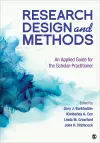
Research Design and Methods
4 contributors - Paperback
£84.00
Stacey S. Merola, Ph.D. – President and Principal Scientist
Dr. Stacey Merola is a multiple award-winning evaluator with more than 20 years of social science research experience and over 15 years of experience in program evaluation, as both a manager and an analyst. Since starting Merola Research LLC in 2012, Dr. Merola has evaluated a diverse cross-section of clientele representing government, corporations, nonprofits, and the field of education to understand the effectiveness of their programs. Dr. Merola provides individualized evaluation toolkits so that organizations can be confident in their decision-making. An experienced and effective team leader, Dr. Merola brings together the team best suited to address client needs.
Within the field of education, as President and Principal Scientist at Merola Research LLC, Dr. Merola has provided grant evaluation services for both the k-12 and higher education levels. Much of her work has focused on assessing programs impacting at-risk students. A respected research methodologist, Dr. Merola designed and implemented rigorous evaluations for Discovery Education, Pearson Education, and the Y in Central Maryland. Dr. Merola was also a Project Director on an initiative to create an early warning system for Virginia middle school students to prevent subsequent high school dropout, which built on her experience designing a high school dropout early warning system in Delaware. Her evaluation of the NAME curriculum in Brazil won the American Educational Research Association (AERA) Division H 2018 Outstanding Publication Competition in the Educational Program Evaluation category.
Prior to starting Merola Research LLC, Dr. Merola was a manager on the What Works Clearinghouse’s Middle School and Elementary School Mathematics Curriculum Interventions reviews for five years. As part of this team, she created metrics for rigorous evaluations and reviewed hundreds of studies of math interventions for middle- and elementary school students. Dr. Merola managed and designed instruments for qualitative data collection activities including: case studies of high school Career and Technical Education programs; case studies of middle- and high schools that were implementing a mathematics coaching program for their teachers; and cognitive labs to develop items for the National Assessment of Educational Progress (NAEP). Her evaluation of the Mathematics Instructional Coaches (MIC) program won the American Educational Research Association (AERA) Division H 2012 Outstanding Publication Competition in the Educational Program Evaluation category.
John Hitchcock, Principal Associate
John Hitchcock leads systematic reviews of evidence from education programs and evaluates program impacts. He has two decades of experience implementing and evaluating education interventions, with an emphasis on children with special learning needs.
Before joining Abt Associates, Hitchcock had served since 2013 as director of the Center for Evaluation & Education Policy (CEEP) and associate professor of instructional systems technology at Indiana University’s School of Education. As CEEP’s director, he supervised up to $10 million in annual funding, as many as 40 projects, and a staff of up to 40 researchers, student assistants, and support personnel. He has been a principal or co-principal investigator (PI) on multiple randomized controlled trials. He has supported the What Works Clearinghouse in a variety of roles, from PI to coding trainers, for 15 years.
From 2008-2013, Hitchcock was associate professor of education research and program evaluation at Ohio University (tenured and promoted in 2012). From 1998-2008, he was lead analyst on the Sri Lanka Mental Health Promotion Program, which identified and addressed mental health needs of Sri Lankan youth. From 2006-2008, he worked on two projects for the U.S. Department of Education’s Office of Special Education. For one project, he led a research synthesis that outlined promising evidence-based practices for integrating technology into teaching. For the second project, which involved monitoring student progress, he led product development of activities ranging from creating brochures based on the monitoring literature to contracting with researchers to develop scholarly articles.
To date Hitchcock has co-authored 37 peer-reviewed journal articles, 12 book chapters, and one book. He is co-editing two textbooks on research methods, and he has made 115 presentations at conferences in several international venues. He is co-editor of International Journal of Multiple Research Approaches and co-founder of Dialectical Publishing. He is an editorial board member and former associate editor of School Psychology Review. According to Google Scholar, his work has been cited more than 2,500 times so far.
Mercedes Rubio, Ph.D., Program Director
Mercedes Rubio, Ph.D., is a program director in the Division of Training, Workforce Development, and Diversity, where she handles the National Research Mentoring Network (NRMN) of the NIH Common Fund Enhancing the Diversity of the NIH-funded Workforce Initiative, the Institutional Research and Academic Career Development Awards (IRACDA), the Bridges to the Baccalaureate, Innovative Programs to Enhance Research Training (IPERT), and the Research to Understand and Inform Interventions that Promote the Research Careers of Students in Biomedical and Behavioral Sciences portfolios. She also will serve in the role of program officer in the NIGMS Postdoctoral Research Associate (PRAT) Program.
Before joining NIGMS, Rubio was chief of the Psychopathology Risk and Protective Factors Research Program at the National Institute of Mental Health and was assistant director of that Institute’s Individual Research Fellowship Program. Rubio earned a B.A. in sociology from California State University, Bakersfield, and a Ph.D. in medical sociology from the University of Michigan, Ann Arbor, where she also completed postdoctoral training in nursing in the area of HIV intervention and health disparities.